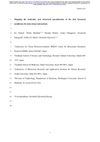 18 citations,
September 2020 in “International Journal of Nanomedicine”
18 citations,
September 2020 in “International Journal of Nanomedicine” Both human and animal-derived small extracellular vesicles speed up skin healing equally well.
 16 citations,
May 2020 in “Frontiers in pharmacology”
16 citations,
May 2020 in “Frontiers in pharmacology” Minoxidil can stop the growth of ovarian cancer cells without harming the heart.
 11 citations,
October 2020 in “Plant biotechnology journal”
11 citations,
October 2020 in “Plant biotechnology journal” Overexpressing SIMK in alfalfa boosts root hair growth, nodule clustering, and shoot biomass.
[object Object]  11 citations,
April 2013 in “Journal of Proteomics”
11 citations,
April 2013 in “Journal of Proteomics” Found different proteins in balding and non-balding cells, giving insight into hair loss causes.
 6 citations,
November 2020 in “Molecular and Cellular Endocrinology”
6 citations,
November 2020 in “Molecular and Cellular Endocrinology” Androgens reduce BMP2, which weakens the ability of certain cells to help hair stem cells become different types of cells.
 September 2020 in “Research Square (Research Square)”
September 2020 in “Research Square (Research Square)” Certain genes influence immunoglobulin levels in Chinese Holstein cows, which can improve calf health.
December 2023 in “Animals” The study mapped yak skin cells to understand hair growth better.
 1 citations,
July 2023 in “F&S Reviews”
1 citations,
July 2023 in “F&S Reviews” Some common medications may harm male fertility by affecting hormones, sperm production, and sexual function.
 11 citations,
November 2021 in “Clinical, Cosmetic and Investigational Dermatology”
11 citations,
November 2021 in “Clinical, Cosmetic and Investigational Dermatology” Resveratrol may help hair grow, but more research is needed.
5 citations,
December 2011 in “Springer eBooks” 19 citations,
May 2022 in “International journal of molecular sciences” PRX01, PRX44, and PRX73 are essential for root hair growth in Arabidopsis thaliana.
 4 citations,
December 2022 in “International Journal of Molecular Sciences”
4 citations,
December 2022 in “International Journal of Molecular Sciences” Zinc is crucial for skin health and treating various skin disorders.
 January 2025 in “Medicina”
January 2025 in “Medicina” Advanced techniques and technologies can improve burn wound healing, but more research is needed.
 April 2023 in “Advanced functional materials”
April 2023 in “Advanced functional materials” The study created a tool that mimics natural cell signals, which increased cell growth and could help with hair regeneration research.
June 2024 in “Ecotoxicology and Environmental Safety” Finasteride harms Daphnia magna's reproduction, growth, and metabolism.
 June 2023 in “Antioxidants”
June 2023 in “Antioxidants” Lipids from Schizochytrium sp. help prevent hair loss by protecting hair cells from damage and promoting hair growth.
 17 citations,
September 2019 in “Journal of Cell Biology”
17 citations,
September 2019 in “Journal of Cell Biology” Hair follicle regeneration may slow tumor growth.
[object Object]  July 2024 in “ADMET & DMPK”
July 2024 in “ADMET & DMPK” Surface-modified nanostructured lipid carriers can improve hair growth treatments.
11 citations,
November 2021 in “International journal of molecular sciences” Gut microbes significantly affect brain steroid levels.
 January 2023 in “IntechOpen eBooks”
January 2023 in “IntechOpen eBooks” The document concludes that specific methods for making diazine-based drugs can lead to high yields and are important for creating effective treatments for various diseases.
 1 citations,
March 1997 in “Journal of Chromatography B: Biomedical Sciences and Applications”
1 citations,
March 1997 in “Journal of Chromatography B: Biomedical Sciences and Applications” Researchers developed a method to measure different forms of a drug that could help treat prostate issues and hair loss, and found how these forms behave in animals.
 24 citations,
July 2017 in “Structure”
24 citations,
July 2017 in “Structure” FGF9 controls which receptors it binds to through a process where two FGF9 molecules join, and changes in FGF9 can lead to incorrect receptor activation.
 9 citations,
April 2023 in “Journal for Research in Applied Sciences and Biotechnology”
9 citations,
April 2023 in “Journal for Research in Applied Sciences and Biotechnology” Zinc is important for growth and health in animals, plants, and humans, and not having enough can cause various problems.
63 citations,
November 2012 in “Journal of Cellular Biochemistry” Runx1 affects hair growth, cancer development, and autoimmune diseases in epithelial tissues.
 2 citations,
April 2021 in “International Journal of Molecular Sciences”
2 citations,
April 2021 in “International Journal of Molecular Sciences” The study concluded that changing the culture conditions can cause sika deer skin cells to switch from a flat to a 3D pattern, which is important for creating hair follicles.

Forensic hair analysis for drugs is now more reliable and accurate.
 19 citations,
March 1990 in “Journal of Cardiovascular Pharmacology”
19 citations,
March 1990 in “Journal of Cardiovascular Pharmacology” Minoxidil affects rat fluid dynamics, altering pressure and circulation, improving blood flow and hair growth.
 9 citations,
April 2018 in “Journal of trace elements in medicine and biology”
9 citations,
April 2018 in “Journal of trace elements in medicine and biology” Hair analysis can show nutritional status and environmental exposure, with phosphorus being very stable in hair and differences found based on gender and conditions like depression and autism.
 466 citations,
August 2004 in “Journal of the American Academy of Dermatology”
466 citations,
August 2004 in “Journal of the American Academy of Dermatology” Rosacea is a skin condition with unclear causes, classified into four subtypes.
 2 citations,
April 2020 in “bioRxiv (Cold Spring Harbor Laboratory)”
2 citations,
April 2020 in “bioRxiv (Cold Spring Harbor Laboratory)” The skin's basement membrane is specially designed to support different types of connections between skin layers and hair follicles.
























